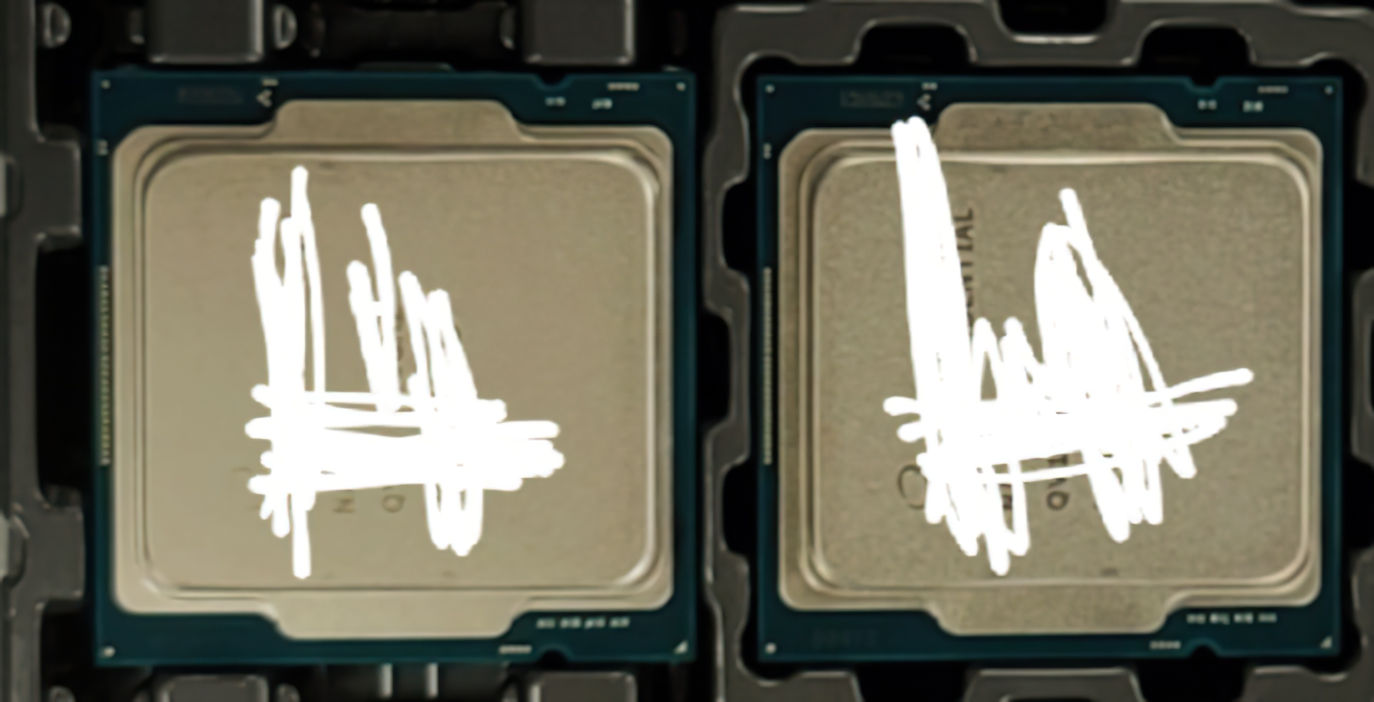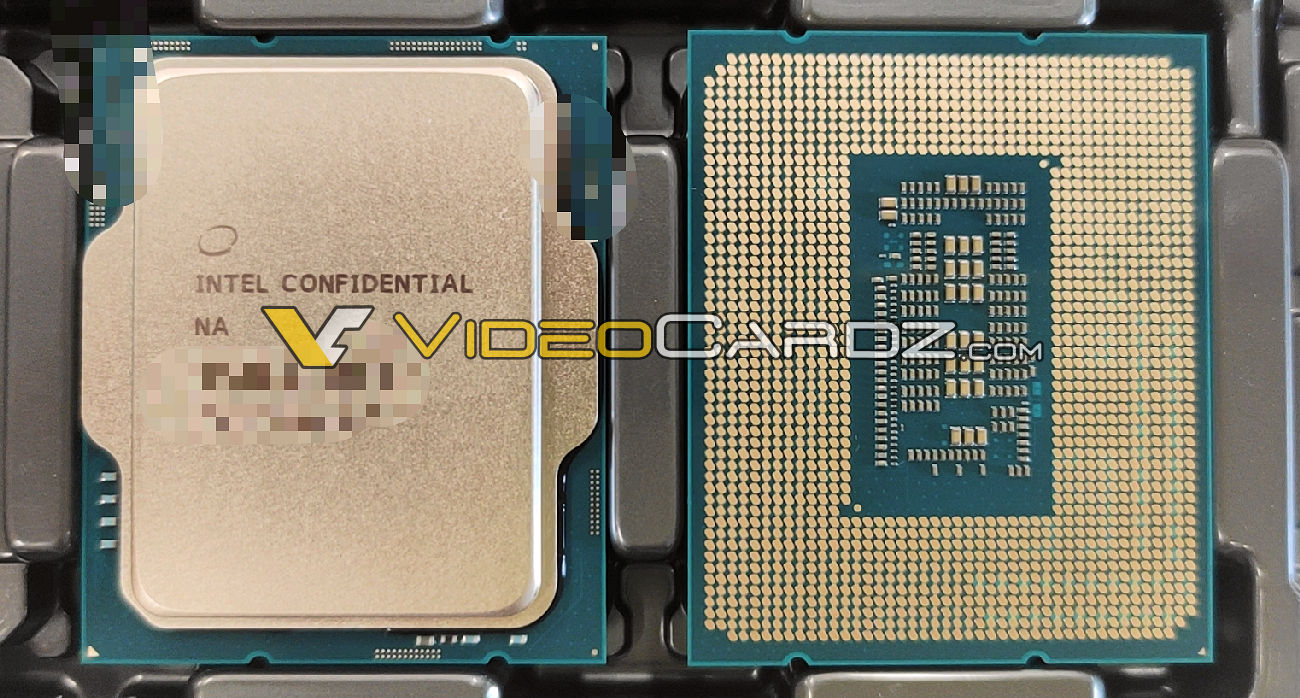Intel Rocket Lake, Alder Lake CPU Photos Leaked Online
Alleged photographs (via VideoCardz) of Intel's Rocket Lake and Alder Lake desktop processors are making their way around the hardware world. As this is a leak, it is best to treat the photographs with a healthy dose of skepticism until more information comes to light. The chips may be early engineering samples, but their presence in the wild may hint at Intel's urgency to unleash the new processors to fend of AMD's Ryzen 5000 attack.
Rocket Lake, which is the successor to Comet Lake, will be the first out of the pair to hit the retail market. Slated for a first quarter release in 2021, Rocket Lake leverages the Cypress Cove microarchitecture, and Intel has already touted an instruction per cycle (IPC) gain up to double digits. The processors are expected to reside on the LGA1200 socket. Although not confirmed by Intel, Rocket Lake should be backward compatible with Intel 400-series motherboards, as Gigabyte has insinuated in one of the company's Aorus livestreams. Besides the Cypress Cove cores, PCIe 4.0 support is another one of Rocket Lake's novelties. Many 400-series motherboards on the market are specifically purposed for PCIe 4.0, which explains the retro compatibility. Nonetheless, a new army of 500-series motherboards will accompany Rocket Lake's launch.
In regards to design, Rocket Lake will top out at eight cores and 16 threads. The maximum configuration feels like a disappointing regression since Comet Lake came with up to 10 cores. For once, Rocket Lake isn't based on a rewarmed Skylake iteration, so the number of cores might not be as relevant. If early benchmarks are to be trusted, an octa-core Rocket Lake chip substantially outperforms the 10-core Core i9-10900K in single-threaded workloads, lending credence to Intel's IPC claims. In multi-threaded workloads, however, the Core i9-10900K still has a slight upper hand.
Intel stated last week that the chipmaker has started sampling Alder Lake processors. While an exact timeframe is unknown, it's plausible that Alder Lake won't touch down until the second half of 2021.
Rocket Lake might finally bring PCIe 4.0 support to Intel's desktop platform, but Alder Lake is a unique processor in its own right. Alder Lake is Intel's first desktop heterogeneous chip to bind large and small cores in a single package. The concept is similar to Arm's big.LITTLE microarchitecture, but Intel has branded its design as Big-BIGGER. The Golden Cove cores inside Rocket Lake will tackle the more demanding workloads, while the smaller Atom Gracemont cores job is to take care of the less trivial workloads.
Alder Lake might be one of Intel's most confusing processors to date. A coreboot patch has revealed up to 12 potential configurations for Alder Lake. With two different microarchitectures in the same chip, Intel has a lot of wiggle room. Thus far, the flagship Alder Lake SKU appears to come with eight Golden Cove cores and eight Atom Gracemont cores. Technically, it's a 16-core processor, but only the Golden Cove cores are rumored to feature Intel's Hyper-Threading technology.
It's evident from the Alder Lake photograph that the processor will require a new socket. Ironically, Intel documents have substantiated that Alder Lake commands the new LGA1700 socket. That's exactly 500 more pins than the current LGA1200 socket. Logically, a new socket means a new chipset with corresponding motherboards. Assuming that there's no setback with Rocket Lake, it's more than likely that the chipset for Alder Lake will carry the 600-series branding.
Get Tom's Hardware's best news and in-depth reviews, straight to your inbox.

Zhiye Liu is a news editor, memory reviewer, and SSD tester at Tom’s Hardware. Although he loves everything that’s hardware, he has a soft spot for CPUs, GPUs, and RAM.
-
everettfsargent "Slated for a first quarter release in 2021, Rocket Lake leverages the Cypress Cove microarchitecture, and Intel has already touted an instruction per cycle (IPC) gain up to double digits. ... While an exact timeframe is unknown, it's plausible that Alder Lake won't touch down until the second half of 2021. ... It's evident from the Alder Lake photograph that the processor will require a new socket."Reply
So a very late Q1'21 launch for RL followed by a potential Q2'21 launch of AL on a new socket. Yeah right, that is s-o-o-o-o-o-o-o-o-o-o going to happen. In other words, it is very plausible that you don't have an bleeping clue. There is an Easter Bunny. -
nofanneeded Big little is only usable in mobile and not desktop . Intel should have gone three or four threads per core instead of this ,Reply -
JayNor "Rocket Lake might finally bring PCIe 4.0 support to Intel's desktop platform..."Reply
I think pcie4 has been confirmed by an Intel spokesperson already, so why the "might".
Alder Lake "might" be bringing pcie5 to a desktop platform before AMD, based on the leaks in notebookcheck.
When might AMD "finally bring" pcie4 to a laptop platform? -
JayNor Replynofanneeded said:Big little is only usable in mobile and not desktop . Intel should have gone three or four threads per core instead of this ,
Have to disagree. Intel stated the Lakefield small cores were more performant than multi-threading. In addition, Gracemont add avx2, and simd operations are normally not as performant in combination with multi-threading ... so the Gracemont simd contribution may be a nice win. -
InvalidError Reply
Seems perfectly fine to me: most programs have a handful of threads that require high performance and dozens of others that just do background or otherwise non-performance-critical stuff, so it makes sense to have some more power-efficient cores to take care of those and leave the high-performance cores unencumbered by low-priority tasks. The game I play most is WoW and ~90% of its CPU usage comes from three of its 30ish threads.nofanneeded said:Big little is only usable in mobile and not desktop.
You also have all of Windows' background processes, all of your Chrome/Firefox/Edge/Opera/whatever tabs, all of your own background stuff and opened applications, etc. that could use low-power cores to leave performance cores available for games or whatever the foreground process is and its dependencies. -
everettfsargent So, in summary, two generations on LGA1200 and who knows how many generations on LGA1700 other than at least one. Meanwhile, AMD will have had four generations on AM4. Looks to me like someone told Intel to kill itself in the desktop space and that Intel is determined to do so. BTW who the heck does LGA1150, LGA1151, LDA1155 and LGA1156 anyways, four sockets for a total difference of six pins. Now you know why Intel continues to makes so much money ... dittoheads who have just enough money for annual CPU/MB upgrades. Oh look. I'm still on a 22nm Haswell as I decided to wait until 10mn arrived on the Intel desktop. Bought an AMD 3700X in the meantime.Reply -
spongiemaster Reply
Weird phrasing by the article. Alder Lake has never been rumored to launch in the 1st half of 2021. According to Intel, the platform will support DDR5 and PCIE5 which means it was never going to get released H1 of 2021. It will likely be late in 2021 to early 2022 when it is released.everettfsargent said:"Slated for a first quarter release in 2021, Rocket Lake leverages the Cypress Cove microarchitecture, and Intel has already touted an instruction per cycle (IPC) gain up to double digits. ... While an exact timeframe is unknown, it's plausible that Alder Lake won't touch down until the second half of 2021. ... It's evident from the Alder Lake photograph that the processor will require a new socket."
So a very late Q1'21 launch for RL followed by a potential Q2'21 launch of AL on a new socket. Yeah right, that is s-o-o-o-o-o-o-o-o-o-o going to happen. In other words, it is very plausible that you don't have an bleeping clue. There is an Easter Bunny. -
spongiemaster Reply
Intel has been doing 2 generations per socket for over a decade. It's not news, and not likely to change. Just because a CPU can be dropped into a socket doesn't mean it will work. As seen in the chart below there is not AM4 chipset that supports all 4 generations of Ryzen CPU's. The most any chipset supports is 3, with the B550 only supporting 2, just like Intel.everettfsargent said:So, in summary, two generations on LGA1200 and who knows how many generations on LGA1700 other than at least one. Meanwhile, AMD will have had four generations on AM4. Looks to me like someone told Intel to kill itself in the desktop space and that Intel is determined to do so. BTW who the heck does LGA1150, LGA1151, LDA1155 and LGA1156 anyways, four sockets for a total difference of six pins. Now you know why Intel continues to makes so much money ... dittoheads who have just enough money for annual CPU/MB upgrades. Oh look. I'm still on a 22nm Haswell as I decided to wait until 10mn arrived on the Intel desktop. Bought an AMD 3700X in the meantime.
-
everettfsargent Asus confirms AMD Ryzen 5000 support on X470, B450, B450 IIReply
https://hexus.net/tech/news/mainboard/146167-asus-confirms-amd-ryzen-5000-support-x470-b450-b450-ii/
Oops! -
InvalidError Reply
LGA1156 is the only mainstream Intel socket from the last ~25 years to have supported only one CPU generation instead of two. Unless Intel makes a significant design mistake with LGA1700, it is practically guaranteed to be two generations as usual.everettfsargent said:So, in summary, two generations on LGA1200 and who knows how many generations on LGA1700 other than at least one.

